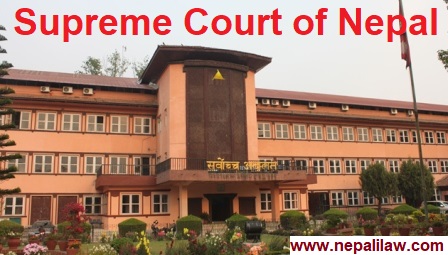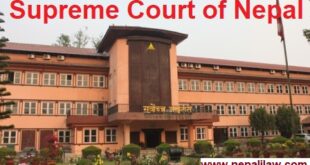The Supreme Court of Nepal has delivered a landmark judgment to ensure the rights of Dalit Community of Nepal. SC issued a directive order in the name of the Government of Nepal to make necessary arrangements to ensure the rights of the Dalit community and social justice.
The directive orders have been issued to make necessary mechanism and arrangements to ensure equality, equality, inclusion, non-discrimination, participation rights and social justice of the Dalit community. A joint bench of justices Ananda Mohan Bhattarai and Justice Prakash Kumar Dhungana of Supreme Court of Nepal had passed the order on a writ petition filed by advocate Prakash Nepali.
Petitioner argument
The Legislative Parliament has made various laws as per Article 40 of the Constitution of Nepal. The Government of Nepal has issued some laws for the implementation of human rights protected in the Constitution. These laws are not sufficient to enforce the constitutional right under Article 40.
These laws need to be amended to ensure the Dalit community’s right to education, right to land, right to health, right to housing, right to employment, proportional inclusion, social justice and a dignified life.
The constitution is not only a document of rights but also a document of justice. The defendant Ministry and the Law Commission related to the fundamental rights mentioned in Article 40 seem to have neglected the law making process.
Also Read: How can Divorce between Husband and Wife in Nepal with Legal provision
The Acts do not seem to have made legal provision for the Dalit community in a meaningful, special and specific manner as per the spirit and provisions of the Constitution.
It was demanded to be amended the unconstitutional acts, laws and rules as per the constitution and to make a Unified Dalit Rights Act for the implementation of fundamental rights.
Defendant’s argument
Since the law has been enacted with the necessary amendments to the laws in the federal parliament as demanded in the writ petition, the constitutional right has not been violated. Therefore, there is all similar written reply to be dismissed the writ petition.
The written statements submitted by the defendant’s Law commission, Government of Nepal, Ministry of Land Management, Cooperatives and Poverty Alleviation, Ministry of Education, Science and Technology, Ministry of Culture, Tourism and Civil Aviation, Ministry of Urban Development, Federal Parliament Secretariat, Ministry of Law, Justice and Parliamentary Affairs, Ministry of Labor, Employment and Social Security, Ministry of Federal Affairs and General Administration, Ministry of Health and Population.
Court’s order
Supreme Court observed that for the effective implementation of the rights guaranteed by Article 24 and Article 40 of the Constitution of Nepal, the existing policy and law should be reviewed, improved and strengthened with consultation with the concern community and stakeholders.
Also Read: Supreme Court issue directive order to enact law related Compensation of Crime victims
SC found that the constitution itself has accepted the National Dalit Commission as a leading constitution institution on issues related to Dalit and untouchability. It also mentioned in the order that appropriate mechanism should be formed within three months from the date of receipt of the order and work should be started through that mechanism with giving priority to the cooperation and coordination of the Commission.
Court elaborated that in the writ petition of Binay Kumar Panjiyar, the government has been warned to ensure the rights of dalits considering the fact and directive orders have been issued in the name of the Prime Minister and the Office of the Council of Ministers.
Similarly, in view of the issues mentioned in various chapters of the verdict/order, it is necessary to formulate policy for the implementation of the rights of the Dalit community, review and strengthen the law, plan, budget, implementation system and procedure.
Court also directed the Office of the Attorney General to write to the Directorate of Judgment Implementation which is under the Supreme Court to monitor the implementation of the this order, inform the defendants and coordinate with the Government of Nepal, concerned ministries, governmental and constitutional bodies and commissions.
However, in the petition, the court has rejected the demand of the Unified Dalit Rights Act regarding the effective implementation of the rights provided by Article 24 and Article 40 of the Constitution. Stating that the Unified Dalit Rights Act alone does not address the need for effective implementation of caste discrimination and untouchability and Dalit rights.
Also Read: Phulmaya Versus District Court of Siraha, Case: Habeas Corpus, 078-WH-0008 (Full Text)
The Apex court, with taking into account said Dalits have been historically deprived from their fundament rights, dignified life and liberty. There is a need for institutional leadership (Task force) to work for including data collection, comprehensive policy formulation, review of laws based on that policy, planning according to policy and law, budget management and proper coordination.
Though speaking about the rights of dalits, the issue of multiple discrimination analyzed and the internal inclusion within dalits has also been pointed out. For the first time, Article 40 (7) of the constitution of Nepal has been explained by the Supreme Court.
Court explained that there are multiple discrimination in the Nepalese community, it particular focuses on women and Madhesi Dalits. Elaborated with an example that Dalit women and Dalit in Madhesi community within the Dalit community can also be taken be consideration. They have additional discrimination and deprivation as being Women, being Madhesi Dalit, being Madhesi Dalit woman indicates such polygamy. Although sub-article (7) of article 40 states that facilities should be distributed fairly on the basis of proportionality, not much work has been done in this regard at the law and implementation level.
The system of proportionality can be made even within the Dalit community by prioritizing the gender, caste and group at the bottom on the basis of economic, educational and human development index and also by considering the ethnic proportions of the identified Dalit community in the hills and Terai. Though, it seems necessary to pay attention to this while formulating policy, law and implementation plan in the context of implementation of Article 40 (7).
Similarly, the Court encouraged the National Dalit Commission and defined its duty stating that the constitution has given authority to study and investigate the overall situation of the Dalit community, to identify the issues of policy, legal and institutional reforms in that regard, and also to monitor the effective compliance of the relevant laws.
The court drawn attention of Dalit Commission asserting that the commission could set up its office in the state as per the need. In regard to some of rights of Dalit mentioned in the constitution, the Commission can coordinate and pursue assistance from all three levels of government as it falls under the jurisdiction of federal, state and local level. And pointed out to make arrangements for the effective implementation of the rights under article 40 by accepting the National Dalit Commission as a cooperative body.
Also Read: SC issued order to the CDO to grant Nepali citizenship as per Constitution
In this order, Supreme Court mentioned the situation of the Dalit community in Nepal, its historical deprivation, exploitation and the present situation of discrimination, exclusion and oppression. Also expressed to be eliminated with considering the discrimination against Dalits.
Similarly, SC illustrated the nature of the nation as described in the constitution and the basic values of the constitution and equality, non-discrimination, equality and participation, discrimination in the spirit of the principles of social justice, exclusion and the state of oppression have been analyzed.
It also explains the interrelationships of the rights of Dalits in the light of human rights law, its message in national law, the rights against untouchability and discrimination enshrined in the constitution and the rights of dalits and what principles of justice it accepts.
It is seen that efforts have been made to address the challenges faced in the implementation of the rights enshrined in the constitution. The full text of the decision made on April 20, 2021 BS has been made public on 31 January, 2022.
Here, you can read full text of this judgement in Nepal Language
 Nepali Law A complete legal information portal
Nepali Law A complete legal information portal

